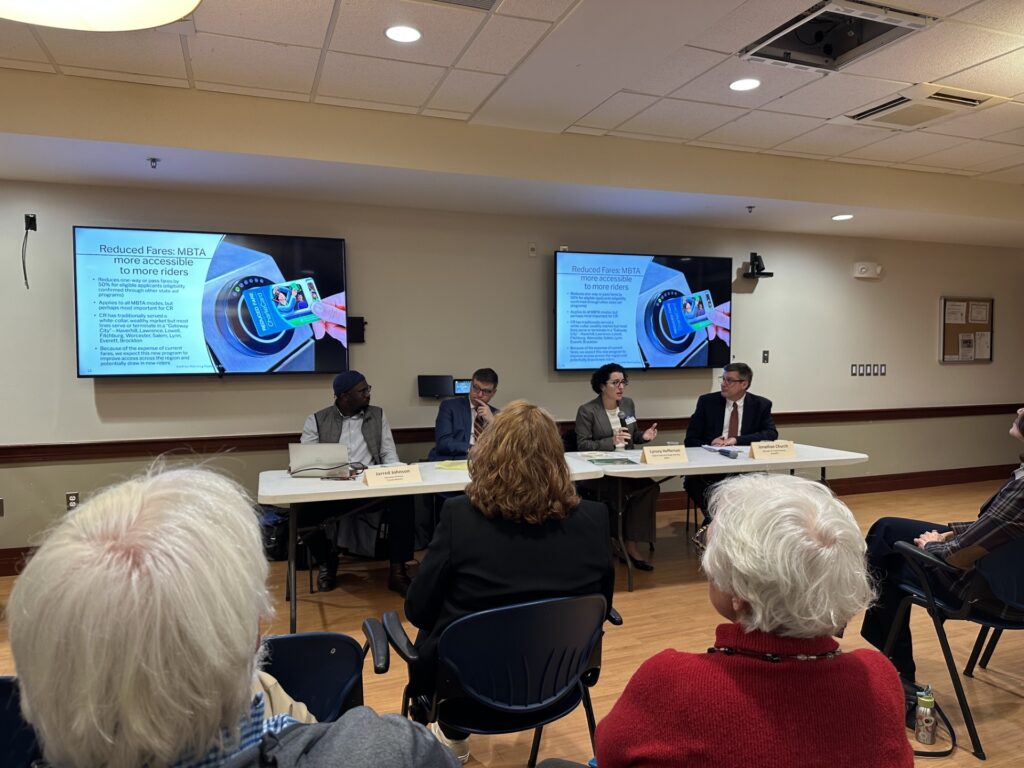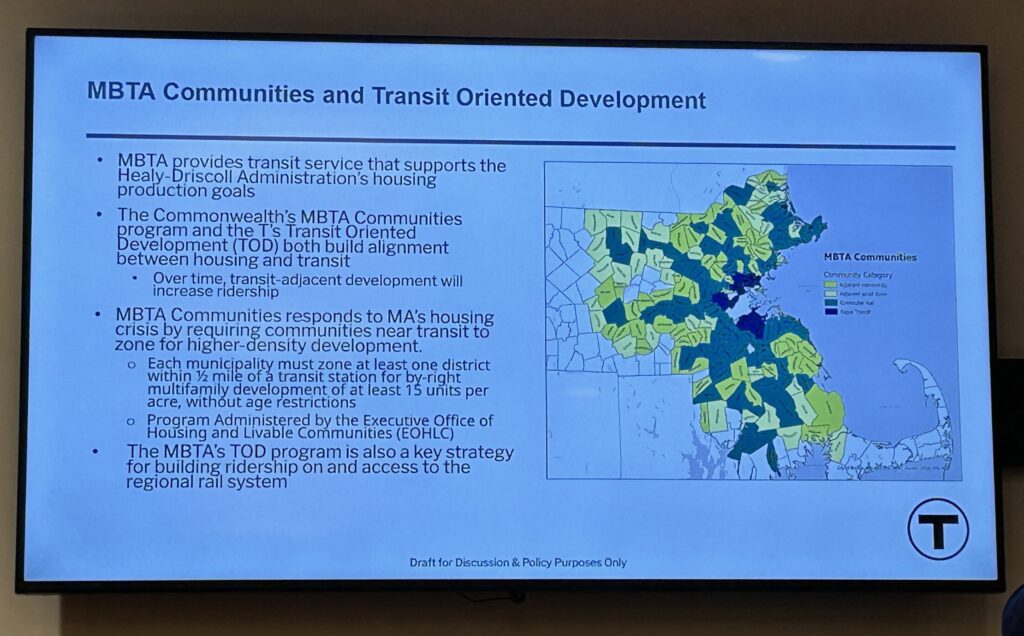Two of Acton’s Select Board members – David Martin and Alissa Nicol – were among almost 100 participants in a “Beyond the Core” transportation forum on Monday, November 9, at the Lexington Community Center, organized by Lexington’s Transportation Director, Susan Barrett. Representative Michelle Ciccolo of the 15th Middlesex District made opening remarks and Jarred Johnson of Transit Matters moderated. Presenters were MBTA Advisory Board Executive Director Brian Kane, MBTA Chief of Policy & Strategy Lynsey Heffernan, and Manager of Transit Planning for MassDOT (and former administrator of the Worcester Regional Transit Authority) Jonathan Church. The goal was to address how to achieve more and better transit in the communities outside of Boston.

Barrett said after the forum that attendees had hailed from a variety of municipalities from Winchester to North Reading, Acton to Bedford to Wakefield. Several Chambers of Commerce sent representatives, including one who is a business owner with restaurants in multiple towns. Municipal planners and economic development directors came, and town managers and school and transportation committee members. One woman works at the Bedford Veterans Administration medical facility, focused on veteran suicide prevention. She has been actively working on solving the transportation issue, as she knows it impacts veterans’ lives. Another participant, Andrew Jennings, the Billerica representative on the Lowell Regional Transit Authority (LRTA) board, has been pursuing better connections between the LRTA and the MBTA. Acton is also part of the LRTA, as are our neighbors in Maynard, Carlisle, and Groton. Mike Gowing represents Acton on the advisory board.
While Acton is considered an “MBTA municipality”, the Ride paratransit van service for people with disabilities does not come out as far as Acton. Acton residents who use the ride have to get to and from Concord, where they arrange to be picked up by the Ride. For shorter trips, Acton residents have various van services available. Among the towns around Acton, some are part of the LRTA (Maynard, Carlisle), some are part of the Montachusett RTA (Littleton, Stow, Boxborough), one is part of the Metrowest RTA (Sudubury), and one is part of the MBTA (Concord).

Ciccolo spoke of the changing transportation funding environment, and Johnson discussed the disparate organizations working toward the shared goal, from planning organizations to regional transit authorities and local transportation committees. “Some of us have asked, ‘Isn’t there a better way to do this?’” he said. He pointed out that suburban service is a lot thinner than it was a few decades ago. Ciccolo lamented that not enough constituents speak to their legislators about transportation, and urged listeners to do so.
Kane also talked about the effect of insufficient funding. “The MBTA is going broke,” he said. He added that estimates of the true cost of providing a good system must not be lowballed. “We must stop the era of kicking the can down the road.” Kane has written about the MBTA’s funding challenges in the MBTA Advisory Board, reports Born Broke and the follow-up, Always Broke. He said that people should reach out to the governor to demand a solution to the MBTA’s expected $700 million shortfall in 2026, to avoid more cuts in service.
Heffernan said that the new GM at the MBTA, Philip Eng, is here at an interesting time, “at a precipice.” She pointed to recent improvements such as reduced fares for people at 200% of the poverty level. The application is extremely easy, she said, where applicants provide some identification, show that they are receiving one other government benefit, and say where they want the MBTA to mail the card. “We’ve enrolled about 16,000 [participants for reduced fares] in three months. The goal is 60,000. Eighty percent of bus riders are low income. Heffernan said the MBTA is also thinking about connections to “gateway cities” such as Lowell, Lawrence, and Fitchburg.
Heffernan also said she was proud of the more than 1000 new hires at the MBTA and said the question now is how to get them to stay. She said, “For the first time in15 years, every union is under contract. Everyone got a raise.
Church described the Program for Mass Transportation (PMT) planning process which is underway, planning as far ahead as 2050. He also noted that some services were lost during the COVID pandemic, and he and his staff have been conducting an inventory of transportation services such as shuttles and medical transportation.
The question and answer included a discussion of transportation’s relationship to economic vitality. “Every time you get in your car, you probably spend some money,” one of the speakers said. “Movement of people is what moves the economy.” Ideas were bandied about on “how to make transit cool again.” One speaker said that all the perks such as wifi on the buses and charging ports are cherries on top of the basic imperative to get people onto frequent, reliable, accessible transit.
Barrett said that the Town of Lexington offers a Transit Explorers program to youth in 6th to 12th grade to teach them how to use the local bus, Lexpress – similar to Acton’s “CAT Bus” – and to use Google Transit. The students take the Lexpress bus in one direction, enjoy a treat, and take a T bus back.
After the forum, Select Board Member Nicol said the takehomes for Acton from the forum were the need for more affordable fares for the commuter rail, and the need for jobs near transit. She noted, “The speakers said that the reduced fare program for low-income riders is more successful than the MBTA anticipated. It would be beneficial for there to be a similar program for college students. My son is now at university in Cambridge, and has chosen to drive rather than take the train due to the $12 fare. We live less than a half mile from the South Acton Commuter Rail station and he’s commuting to Porter Square.”
Nicol also commented that a commercial revitalization of South Acton Village could boost ridership. “People already commute to Acton on the train and take the shuttles from there to different parts of town. It would be great to have people taking the train to jobs near the station. The village zoning that was recently passed at Town Meeting, the Economic Development Planning process that is now underway, and the efforts to create a Cultural District in South Acton, will hopefully spark such a revitalization.”
Select Board Member Martin commented, “Public transportation is essential for those without access to a car, and prevents unbearable traffic congestion for all of us. There are many exciting things that the MBTA has on the drawing board, including every-half-hour commuter rail service. However, it’s all stuck because of funding. This year the Legislature dealt with some transportation problems. Next year, they must come up with sustainable funding mechanisms for the MBTA.”
To stay engaged with the Program for Mass Transportation (PMT), which will define a 25-year vision for transit in eastern Massachusetts, sign up for MassDOT newsletters & join the TransitMatters’ mailing list.
The forum was recorded by LexMedia, Lexington’s community media center.
Franny Osman is a transportation activist turned Acton Exchange editor.
